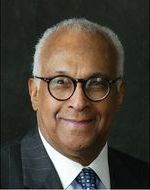In Memoriam: LaSalle D. Leffall, Jr., MD (1930-2019) – CDPR22

LaSalle D. Leffall, Jr., MD (1930-2019) was an esteemed surgical oncologist and a beloved educator. Dr. Leffall was born in Tallahassee, Florida, on May 22, 1930. His brilliance was evident early in life as he was only 15 when he completed high school and 18 years old when he graduated summa cum laude from the historically Black Florida Agricultural and Mechanical College in Tallahassee, Florida. After earning a medical degree from Howard University Medical School in Washington, D.C., in 1952, Dr. Leffall completed his residency at Freedmen’s Hospital, known today as Howard University Hospital, followed by a surgical oncology fellowship at the Memorial Sloan Kettering Cancer Center in New York City. Dr. Leffall served as a captain in the U.S. Army Medical Corps and was the chief of general surgery at the U.S. Army Hospital in Munich, Germany.
Dr. Leffall returned to Howard University Hospital to join the surgery faculty in 1962, and served as Chairman of its Department of Surgery from 1970 to 1995. During his illustrious career, Dr. Leffall served the cancer research community in many capacities. He was the first Black president of both the American Cancer Society and the American College of Surgeons. He served as the president of the Society of Surgical Oncology and the Society of Surgical Chairs. Dr. Leffall was also the Chairman of the Board for the Susan G. Komen Breast Cancer Foundation, and in 2002, he was appointed the chair of the President’s Cancer Panel by the 43rd U.S. president, George W. Bush.
His autobiography, No Boundaries: A Cancer Surgeon’s Odyssey, chronicles his experiences with battling overt racism in medical services delivered under the egregious doctrine of “separate but equal” clinical care, as well as his efforts to strengthen the health care workforce by increasing the diversity of surgeons through his enormous mentorship platform. When discussing the inequities in educational opportunities that prevented many Black individuals from pursuing careers in medicine, Dr. Leffall was fond of quoting one of his mentors, Dr. Charles Drew, another Black surgeon, a blood banking pioneer, and the first medical director of the American Red Cross, “Excellence in performance will transcend artificial barriers created by man.” Dr. Leffall proudly shared this quote as a source of inspiration to his mentees and as a testimony to his own incredibly strong work ethic.
Dr. Leffall was well aware of the unique obstacles faced by Black individuals because of systemic racism in the health care professions. He was a passionate advocate for providing mentorship and sponsorship to diverse trainees. His commitment to diversity, equity and inclusion was embodied by his career-long dedication to Howard University Medical School, which remains one of the most prolific schools in the United States in graduating Black physicians.
Dr. Leffall had a distinguished affiliation with AACR. In 1993, AACR partnered with the Kellogg Company and the organizers of the Biennial Symposium on Minorities, the Medically Underserved and Cancer to sponsor the LaSalle D. Leffall Jr./Jack E. White Award for Cancer Prevention and Control. The award—created in 1987 to honor Leffall—was given jointly in the 1990s by AACR and fellow sponsors to recognize researchers who had addressed cancer disparities in minority and medically underserved communities.
Leffall became an active member of AACR in 2002, participated in the AACR initiative, Minorities in Cancer Research, and was granted the Emeritus Member status in 2011. In 2007, he was awarded the AACR Public Service Award in recognition of his leadership in the fight against cancer health disparities through excellence in teaching, research, scholarship, patient care, and public service.
Dr. Leffall was a titan. He made a difference in the lives of so many. I’m proud to have known and been personally mentored by Dr. Leffall, who was instrumental in my attending Howard University when he was Dean of its Medical School. I will always cherish the time I spent with him and the invaluable lessons I learned from him.
Sanya Springfield, PhDDirector, NCI Center to Reduce Cancer Health Disparities
I am incredibly proud to be able to count myself as one of the many black surgeons that benefited from Dr. Leffall’s mentorship; the opportunity to interact with him and learn from him was one of the most impactful highlights of my career.
Lisa A. Newman, MD, MPHChief, Section of Breast Surgery, Weill Cornell Medical Center
The health care system we have today, one that, in many ways, is striving to better serve underprivileged and under-resourced communities, would not have been possible without Dr. Leffall’s ability to recognize the truth and his insistence on serving his patients to whatever degree necessary, including revolutionizing and reorienting the entire health care system around greater justice and equity.
Wayne A. I. Frederick, MD, MBAPresident, Howard University
